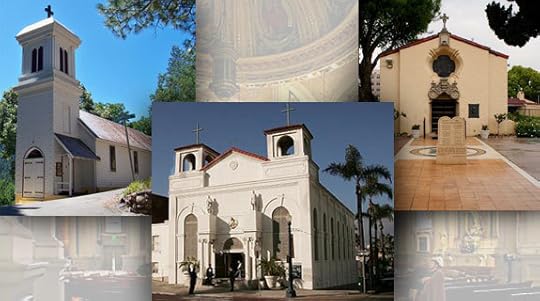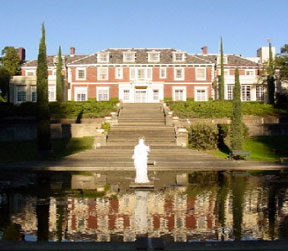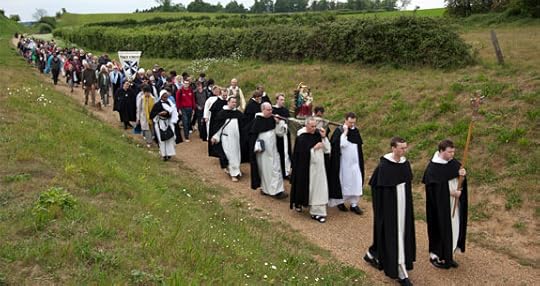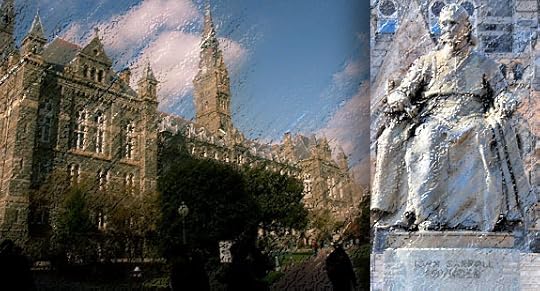Carl E. Olson's Blog, page 213
June 18, 2012
Preparing for a Fortnight for Freedom: A Short History Lesson

Preparing for a Fortnight for Freedom: A Short History Lesson | Benjamin Wiker | Catholic World Report
The HHS mandate is one more momentous step in the repaganization of the West.
The American bishops have declared a “Fortnight for Freedom,” running the 14 days from June 21 (the Vigil of the Feast of Saints John Fisher and Thomas More) to July 4, Independence Day. “Culminating on Independence Day,” the bishops explain, “this special period of prayer, study, catechesis, and public action would emphasize both our Christian and American heritage of liberty. Dioceses and parishes around the country could choose a date in that period for special events that would constitute a great national campaign of teaching and witness for religious liberty.”
Well said. In that same spirit, here is a little history lesson to help prepare us for a Fortnight for Freedom.
First, current history. The Fortnight for Freedom was declared because President Obama is trying to force Catholic institutions, through a Health and Human Services mandate, to provide contraception, abortifacients, and sterilization through their insurance coverage.
And now for a little ancient history to put current events into the widest possible context. To truly see what’s at stake with Obama’s HHS mandate, you must go all the way back to ancient Rome, to the pagan empire into which Christianity was born.
We might think of contraception as something new, a modern thing, just as we think abortion was rare before Roe v. Wade. But that is historically as inaccurate as one could possibly get. The truth is this: contraception, abortion, and infanticide were widely practiced and entirely acceptable in all ancient cultures, including Rome. The acceptability was the result of attitudes toward sexuality. “In antiquity,” historian John Riddle notes, “the evidence suggests, sexual restraint was largely ignored; pagan religion normally did not attempt to regulate sexual activity. Free males could do almost anything sexually, even if they had to resort to slaves, with no moral or societal consequences to themselves.”
Elevating the goal of sexual satisfaction meant that babies were often considered unwanted side effects. Most ancient pagans saw nothing wrong with stopping babies from happening, and used a variety of contraceptive and abortifacient concoctions, ingested or applied, to accomplish this—everything from pomegranate peels, giant fennel, acacia gum, crushed juniper berries, cabbage flowers, date palm, rue, and myrrh, to crocodile dung. If all that failed, they had back-up plans to induce something like a modern-day abortion (hot baths, vigorous exercise, horseback riding, carrying heavy loads, bleeding, punching the stomach, more poisons). The final back-up was infanticide, usually by exposure.
The earliest Christians rejected the whole spectrum, from contraception to infanticide—and this is obviously an essential point for understanding the historical importance of the current standoff between Obama’s HHS and the Catholic bishops.
Mormon author: "I’m perfectly happy not being a Christian."
David V. Mason, an associate professor at Rhodes College and author of My Mormonism: A Primer for Non-Mormons and Mormons, Alike, let's it fly in a recent op-ed for The New York Times:
This is the so-called Mormon Moment: a strange convergence of developments offering Mormons hope that the Christian nation that persecuted, banished or killed them in the 19th century will finally love them as fellow Christians.
I want to be on record about this. I’m about as genuine a Mormon as you’ll find — a templegoer with a Utah pedigree and an administrative position in a congregation of the Church of Jesus Christ of Latter-day Saints. I am also emphatically not a Christian.
For the curious, the dispute can be reduced to Jesus. Mormons assert that because they believe Jesus is divine, they are Christians by default. Christians respond that because Mormons don’t believe — in accordance with the Nicene Creed promulgated in the fourth century — that Jesus is also the Father and the Holy Spirit, the Jesus that Mormons have in mind is someone else altogether. The Mormon reaction is incredulity. The Christian retort is exasperation. Rinse and repeat.
The theologically astute reader will note a significant problem: orthodox Christians do not believe "that Jesus is also the Father and the Holy Spirit", as that is not what the Nicene Creed states. The Son is "one in being with the Father", but he is not the Father, nor is he the Holy Spirit, as they are three divine Persons. The Athanasian Creed states, "For there is one person of the Father, another of the Son, and another of the Holy Spirit. But the Godhead of the Father, of the Son, and of the Holy Spirit is all one, the glory equal, the majesty coeternal."
Small potatoes? I don't think so—if only because it suggests that Mason hasn't considered such matters very well or carefully—but Mason apparently thinks that such doctrines are essentially metaphysical puzzles that have taken up too much time and energy over the centures:
June 16, 2012
"Be a Dad!" by Fr. Larry Richards

"Be a Dad!" | Fr. Larry Richards | Adapted and excerpted from Be a Man! Becoming the Man God Created You to Be | Ignatius Insight
You are going to die!
It doesn't matter how rich we are, or how popular we are, or how powerful we are: we are all going to "kick the bucket" one day. Isn't that a nice thought?
What we have to do is take some time to sit and meditate about taking our last breath. What do you want your wife to say  about you? What do you want your kids to say about you? Once you've decided, "Okay, when I am taking my last breath this is what I want", you can start living your life with your end goal in mind. You will start living in such a way that when the day of your death happens, the people who know you will say what you want them to say.
about you? What do you want your kids to say about you? Once you've decided, "Okay, when I am taking my last breath this is what I want", you can start living your life with your end goal in mind. You will start living in such a way that when the day of your death happens, the people who know you will say what you want them to say.
Death is the ultimate thing that takes control out of our hands. Even if we commit suicide, we cannot control what happens after we die. Not one of us had control over our own birth and not one of us has control of what happens after we die.
I have been to a lot of deathbeds throughout my priesthood, so I know what it is going to be like when you are dying. While you are lying there, the thing that is going to be most important to you is your relationships—the people that you loved and the people that in return loved you.
Then why don't we live every day with that in mind? Make the decision to never let your wife or your kids go to bed or walk out the door without telling them first that you love them—life is just too short! It will change your family. It will change the world.
You should underline John 15:12 in your Bible, where Jesus commands us, "Love one another as I have loved you." This is not an option. He also said, "As the Father has loved me, so have I loved you" (Jn 15:9). Jesus told the people He loved that He loved them.
Why is it that men do not do that? Men are embarrassed. They are afraid. It makes them vulnerable. They think to be a man, you don't go around telling the people you love that you love them; but Jesus told twelve men that He loved them. Then He told us to love others in the same way.
Let me give you a hint: you will never in your life regret that you told your wife and your kids and the people you love that you love them—never. You won't be lying on your deathbed one day saying, "I can't believe that I daily told my loved ones that I loved them. What is the matter with me?"
Now, how do you fall in love with someone? You know that you did not get to know your future wife by meeting her once and giving her forty five minutes to an hour once a week. You spent time with her. You got to know her. The same is true with our relationship with God. It might take you months—it might take you years—but you have to do it. You have to keep spending time with God until the answer to the question of whether or not you know God is unequivocally yes.
We need to know who our true Father is. There's only one Father for everybody: God the Father! That guy you call your dad, he's the instrument of fatherhood, but he's not your true Father.
When we talk about our fathers—whether we had a good father, a bad father, a close and supportive father, or a distant and unsupportive father whom we did not know at all—it doesn't matter as much because the reality is, we all have the same Father in heaven. It's that Father Who will bring healing to us.
Husbands are called to love God primarily through their wives. Your wife is the sacrament of Christ to you. You are the sacrament of Christ to your wife. When she looks at you, she is supposed to see Jesus Christ. That is why Ephesians 5:22–24 is such a wonderful passage. It says, "Wives, be subject to your husbands, as to the Lord. For the husband is the head of the wife as Christ is the head of the Church, his body, and is himself its Savior. As the Church is subject to Christ, so let wives also be subject in everything to their husbands." Many of us remember the translation that said that wives were to be "submissive to their husbands". The problem is that many men just stop with their wives being "submissive". The men love that part, which is why so many women go crazy.
I make this very explicit when I am preaching at a marriage ceremony. I start with the bride and I say, "Sweetheart, you read the Bible every day, don't you?" At first I usually get a "Yes, Father", and then I say kiddingly, "If you lie to a priest, you know, you go to hell." Then she will usually quickly say, "Okay, no, Father." Then I continue, "Well, there is a verse in Ephesians that says, 'Wives, be submissive to your husbands, as to the Lord.' " And then I ask, "Do you think it means what it says?" And I always get an emphatic "No, Father!" Then I literally jump up and down and scream, "Yes, it means what it says!" When I say this, all the feminists in the crowd become very upset and say things like, "This is another reason I hate the Catholic Church." And the bride thinks, "Why did we ever get this priest to marry us?" I love this!
Then, as anyone who knows me knows, I am an equal opportunity offender, so I turn to the groom, who usually likes all of this. Now it is time for the other shoe to fall. I then ask the groom, "You read the Bible every day, right?" He always responds, "No, Father." Then I ask, "Well, do you know what it says in Ephesians after 'Wives, be submissive to your husbands'?" The groom always shakes his head and says, "No." Then I continue, "It says, 'Husbands, love your wives, as Christ loved the Church and gave himself up for her.' " Then I ask, "Do you know what that means?" I then continue kiddingly, "Your life is over!" Then I tell them that every day they need to be more concerned about each other than they are about themselves! That is what marriage is about!
So you need to start to do at least one unselfish act for your wife every day. Surprise her. When was the last time you treated her the same way you did when you were still trying to get her to marry you?
Next, let us focus on your children, which I think is easier because they are a part of you. Do we allow our children to be themselves? Some people think that the best father you can be is a strong disciplinarian. Absolutely, I agree. But just as much as you discipline your children, you must also build them up.
Sometimes we are just harsh and we think this is what God wants, but that isn't the way God is. God loves us. He gives away His life for us. And then He always tells us He loves us. Correct?
One of the roles that men have, given to them by God (see Gen 3:16; 1 Cor 11:3; Eph 5:23), is to be the spiritual leaders of their families. Now this is where I have called men "spiritual wimps" for many years. Many men have let their wives be the spiritual leaders of their families, but this is not the way God created it to be. Now this does not mean that you are the master of your wife and family; it means, like Jesus Christ, you are the servant leader of your family.
First off, this means that you lead by example. You must be a man of prayer. For it is only as a son who listens to his heavenly Father that you can bring the will of the Father to your family. You cannot be a good and true leader unless you are a true and good follower. You must daily spend committed time in prayer with God, then lead your family in prayer. Do you have daily committed time with your family in prayer? And no, grace before meals is not enough!
You need to be the spiritual leader by being a man of sacrifice. You exist to give your life away for others, like Jesus did. That means you give your life for your family first and foremost.
My good friend Danny Abramowicz loves to tell men at men's conferences: "Men, your kids will always love their mother, but they want to become just like you!" If we are not holy ourselves, then our families will not be holy. It is that simple. God is going to speak to men, women, and children, but He is speaking especially to men to help us be His very image.
You are the sacrament of Fatherhood to your children just like St. Joseph was the sacrament of Fatherhood to Jesus. Just as God used St. Joseph to form Jesus Christ in His humanity, so too does He want to use you to form your children. So I would encourage you before you read any further to stop and ask St. Joseph for his intercession for you so you can grow in holiness.
The Lord God of the universe is calling all of us to be great men, men that are examples of Him and who use Him as our example. We are called to become another Christ in this world. Our goal is to bring others to Him.
Do it and you will live forever.
Be a Man! Becoming the Man God Created You to Be | Fr. Larry Richards
• Also available in downloadable e-book format
Men are rediscovering the importance of the spiritual life. And Father Larry Richards is helping them do it. While some writers apply a one-size-fits-all approach to the Christian life, Father Richards draws on his many years of ministry and his own experience as a man to inspire other men as men. 
In Be a Man!, he recounts his struggles to learn true manhood, as well as the inspiring stories of others he has served in his decades as a priest. He tells men how to focus on the right goal, how to live as a beloved son of God, of the need to acknowledge one's faults and to live according to the Holy Spirit, to be a man of true love and of wisdom, to appreciate properly the differences between men and women, to pursue holiness, and to make a difference in the world. Not preachy but direct, Father Richards challenges men to be strong, without putting on a mask of false strength or machismo. He calls men to admit their weaknesses and limitations, while urging them to find strength in faith and genuine love to overcome their sins and faults.
Although a celibate priest, he minces no words when it comes to the place of sexuality--for the unmarried man as well as for the married man. He shows that true manliness is not opposed to love but thrives on it. Father Richards stresses that a relationship with Christ reveals the meaning of a man's life and his identity as a man. He inspires men to become the true heroes they long to be--men of authentic courage, compassion and integrity. This is a highly readable book for men by a man who knows how to talk to men about the things that matter most.
"Father Larry talks straight to men in his own manly style. He pulls no spiritual punches--I don't think he knows how to! He pokes, pushes, sometimes verbally slaps men into being God's men, all with an obvious love for them and faith in their ability to persevere to heaven." -- Dr. Ray Guarendi, radio host and author
"Be a Man is a must-read for all men who are serious about strengthening their relationship with God. This exceptional book speaks clearly and directly, challenging men to live their faith with courage and conviction. Be a Man is a spiritual wake-up call that offers a refreshingly honest presentation of what it means to be a man of God. With a unique blend of humor, passion, and frankness that has become his trademark style, Fr. Larry Richards explores how a Christ-centered male spirituality fosters growth in holiness, and inspires men to become loving servants of their wives, families, and the Church." -- Deacon Harold Burke-Sivers, Aurem Cordis apostolate
Fr. Larry Richards, a popular speaker at men's conferences around the country, is the pastor of an inner city parish in Erie, Pennsylvania. He hosts his own daily national radio show on Relevant Radio, and is the founder of The Reason for Our Hope Foundation.
June 15, 2012
Cardinal George criticizes Sebelius' declaration of "war on citizens"
Francis Cardinal George of Chicago, in his June 17, 2012, column in Catholic New World, writes:
Our current economic problems and political impasses bear devastating witness to a society obsessed with controlling every aspect of experience and life. This drive is deadly and destroys trust, which is betrayed in order to advance one’s own projects. Belief in Christ’s presence and in God’s providence, by contrast, frees people to trust that they can take care of those whom God has given them to love without fear of losing their deepest selves. Devotion to the Blessed Sacrament and to the Sacred Heart of Jesus places us within the safety of God’s infinite love and gives us courage to risk our own lives for the salvation of others. Faith makes us free.
As everyone knows, freedom to express our faith through the public ministries of the church is now outlawed. Contesting the current HHS mandate in which the government usurps the right to determine which of our ministries are truly “religious” and which are not is a series of lawsuits being brought by dioceses and universities and other Catholic organizations. That it is necessary is clear in a declaration from Health and Human Services Secretary Kathleen Sebelius, quoted in many of the plaintiffs’ legal briefs, that “We are at war.” So far as I know, this is the first time that a U.S. government official has declared war on citizens of the United States who do not agree with government policy. The public conversation continues to be manipulated by the government and many in the media, hiding what is at stake in the mandate to strip religious institutions of their identity so that they can be forced to act against their religious beliefs.
Twelve Churches Not to Miss When You Visit California

Twelve Churches Not to Miss When You Visit California | Jim Graves | Catholic World Report
Many beautiful, historic churches reflect the Golden State’s rich Catholic heritage.
California is home to many beautiful Catholic churches, reflections of the faith of their people. As summer is here and California is a favorite destination of tourists, the following is a profile of 12 Catholic churches in the Golden State—one in each of its 12 dioceses—not to miss when visiting. It is just a sampling of the impressive churches California has to offer; many others could have been selected for the list.
The Chicago area is the next region to be featured in this “Churches Not to Miss” series at Catholic World Report. What is your favorite Chicago-area church (including suburbs)? Email your suggestions, with a description of what makes your church special, to webhelp@catholicworldreport.com.
20 Mount Carmel Dr., Oakville, California 94562
(707) 944-2454

Carmelite House of Prayer, Oakville
The Carmelite House of Prayer was originally a mansion built to be the home of a wealthy industrialist, David Doak. Its landscaping was done by John McLaren, designer of the Golden Gate Park in San Francisco. Doak died in 1921, the same year the mansion was completed. A benefactor, Noel Sullivan, bought the mansion and 29 acres of surrounding property and donated it to the Discalced Carmelites in 1955. It was used as a house of formation until 1981, when the facility was designated as a house of prayer and retreat center.
It is located in Northern California, in the Diocese of Santa Rosa. There are six priests and two brothers who live at the House of Prayer currently. Penance and prayer are themes of the community; members are typically orthodox, experienced, and pious. The grounds are beautiful and serene, and the community tries to maintain the peace and quiet necessary for the cultivation of prayer. Visitors are welcome, either for Mass and confession or for retreats and days of recollection.
Read about all twelve churches at www.CatholicWorldReport.com.
June 14, 2012
Original Greek sermons by Origen of Alexandria discovered
From the Forget the Channel blog, which has translated the original article from the Bavarian State Library:
A spectacular discovery was recently made in the Bavarian State Library, in the process of cataloguing the Greek manuscripts from the collection of Johann Jakob Fuggers. While cataloguing a manuscript, Philologist Marina Molin Pradel identified numerous texts of sermons on the Psalms by Origen of Alexandria (AD 185 – 253/54), the most important theologian of the early Christian church before Augustine–sermons which until now had not been known in the original. The importance of this find cannot be overestimated. The attribution to Origen was confirmed, with the highest degree of certainty, by internationally recognised Origen expert Lorenzo Perrone from the University of Bologna.
Origen is regarded as the founder of the allegorical interpretation of Scripture. His works, which are numerous, yet are often no longer extant or only found in Latin translation, are fundamental for Christian thought. As a philosopher, theologian, philologist and preacher, Origen has made a deep impression on the intellectual history from late antiquity to today. His sermons and interpretations of the Psalms were, until now, only fragmentary and only extent in Latin translation. The inconspicuous-looking, extensive Greek manuscript, whose true contents have now been identified, comes from the 12th century.
“The find is extremely important–both in terms of its age and its extent. It will trigger lively discussion in scholarly and research circles, and will even allow new insights into the text of the Greek version of the Bible. All of the church Fathers had read Origen and received his work in depth. The discovery allows us now to deal directly with hitherto unknown original texts”, said General Director Rolf Griebel.
Read the entire post, which includes links to photos of the manuscripts (ht: CF). Origen holds a very significant (if heavily debated) place in early Christian theology. In his April 25, 2007, general audience, Pope Benedict XVI said the following about Origen:
Origen of Alexandria truly was a figure crucial to the whole development of Christian thought. ... He was a true "maestro", and so it was that his pupils remembered him with nostalgia and emotion: he was not only a brilliant theologian but also an exemplary witness of the doctrine he passed on. Eusebius of Caesarea, his enthusiastic biographer, said "his manner of life was as his doctrine, and his doctrine as his life. Therefore, by the divine power working with him he aroused a great many to his own zeal" (cf. Church History, 6, 3, 7). ...
Theology to him was essentially explaining, understanding Scripture; or we might also say that his theology was a perfect symbiosis between theology and exegesis. In fact, the proper hallmark of Origen's doctrine seems to lie precisely in the constant invitation to move from the letter to the spirit of the Scriptures, to progress in knowledge of God. Furthermore, this so-called "allegorism", as von Balthasar wrote, coincides exactly "with the development of Christian dogma, effected by the teaching of the Church Doctors", who in one way or another accepted Origen's "lessons".
Thus, Tradition and the Magisterium, the foundation and guarantee of theological research, come to take the form of "scripture in action" (cf. Origene: Il mondo, Cristo e la Chiesa, Milan, 1972, p. 43). We can therefore say that the central nucleus of Origen's immense literary opus consists in his "threefold interpretation" of the Bible.
Read more. An important book about Origen as theologian and exegete is Henri de Lubac's study, History and Spirit: The Understanding of Scripture According to Origen (orig. 1950; Ignatius Press, 2007). The Introduction is available on Ignatius Insight.
In the Middle of the Journey

In the Middle of the Journey | James Kalb | Ecclesia et Civitas | Catholic World Report
Catholics need to oppose the movement toward a society that prizes above all else security, efficiency, and the ever-more-demanding liberal version of human rights.
The Church favors peace, and her basic concern—leading men to God—is not specifically political. For that reason, her approach to politics has generally been irenic. She urges the faithful to obey the law, respect the powers that be, and interpret motives in a favorable light. She offers criticism at times, since she has her own view of social relations, but her normal approach to the political order is cooperative.
From that standpoint, the 19th and early 20th-century Church—which found herself denouncing the dominant tendencies of the age—appears the exception. The reason for her approach was defense of herself and the faith. She was being deprived of her position in society, for example in education and in matters relating to family life. In many countries her property was confiscated and her right to run her own affairs denied. In some places persecution went to violent extremes, as in revolutionary France, Mexico, Spain, and Russia.
Such events reflected a general attempt to replace Christianity as a social authority with an understanding of man, the world, and social obligation that leaves God out of the picture. The Church was no longer facing the usual problem of flawed government, or even the problem of a tyrant who preferred his private to the public interest. She was facing a powerful movement that wanted to eliminate Catholicism as a public presence and would go very far to do so. In such a setting usual approaches no longer seemed to apply.
After the Second World War there was a general relaxation of ideology in the West. War and revolution had shown the dangers of extremism, common struggle against manifest evil had deepened feelings of kinship, and a kinder and gentler form of liberal modernity seemed ready to accept the need for ethical values that were independent of the state. The political authorities seemed ready for the Church to put forward what she had to offer, and to accept the principled cooperation of those who accepted her message.
Vatican II therefore signaled a reversion to the Church’s usual attitude of general acceptance and support for the political powers that be. Modernity seemed here to stay, it had brought some good things, its basic goals could be seen in a positive light, and it now seemed willing to let the Church try to supply what it lacked. If she could find the right way to do so, she might be able to restore her lost position of rightful influence, perhaps in a different form. So why not give it a try?
June 13, 2012
What To Do About GU?

What To Do About GU? | R. Michael Dunnigan | Catholic World Report
Some are ready to declare canonical penalties against Georgetown “dead on arrival.” They shouldn’t be.
“The report of my death has been grossly exaggerated.” — Mark Twain
Father Michael Orsi argues in a June 4, 2012 article for Crisis that, although Exorcist author William Peter Blatty’s contemplated canonical action against Georgetown University “is both noble and correct,” it nonetheless “will be dead on arrival.” Father Orsi does well to point out some of the hurdles that an action like this one faces, but in the final analysis, his judgment is too defeatist and too pessimistic. Blatty’s Georgetown action is by no means “DOA.”
To begin, in the interest of full disclosure, I should say that I am a canonist and have consulted with some of the organizers who are assisting Mr. Blatty. However, I have never spoken with Mr. Blatty and have not been asked to represent him.
Last month, Blatty—a writer and filmmaker who graduated from Georgetown in 1950—launched a website devoted to collecting signatures for a petition expressing “grave concerns” about the university’s “twenty-one year refusal to comply fully with the law of the Church through the implementation of the general norms of Ex corde Ecclesiae and its eleven year non-compliance with certain particular norms adopted for the United States.” Blatty also posted a letter on the site stating that he is looking into canonical penalties against Georgetown “that will include, among others, that Georgetown’s right to call itself Catholic and Jesuit be revoked or suspended for a time.”
I believe that any judgment on Blatty’s action against Georgetown is premature for the simple reason that there is no such action yet. He is indeed contemplating a canonical procedure against Georgetown, but his public letter makes clear that a formal petition is only a possibility at this point (“We may choose to file…” [emphasis added]). Moreover, that public letter also suggests that Blatty is willing to engage in a dialogue with Georgetown about the issues. In fact, I suspect that he greatly would prefer, not to deprive Georgetown of its Catholic identity, but rather to see his alma mater once again embrace that identity with affection and ardor.
Why do some Georgetown students and alumni believe that their university has compromised its Catholic identity? One could point to several recent events that mark the nation’s oldest Catholic university as more of a counter-witness than a witness to its faith:
June 12, 2012
"Indivisible" co-author Jay W. Richards on what is uniting Christians, dividing Americans
Jay W. Richards is a senior fellow at the Discovery Institute and a contributing editor at The American magazine and the Enterprise Blog at the American Enterprise Institute. He is also the co-author of Indivisible: Restoring Faith, Family and Freedom Before It's Too Late. He spoke with Catholic World Report recently about some current events relating to themes and ideas addressed in that book, including freedom, the role of government, progressivism, and Church-state relations.
Catholic World Report: Let’s imagine George Washington and Thomas Jefferson have time traveled to our current day. How might you  explain to them how and why the United States has reached a point where the federal government is poised to force businesses and institutions, including Christian schools and organizations, to fund contraception, sterilization, and abortion-inducing drugs?
explain to them how and why the United States has reached a point where the federal government is poised to force businesses and institutions, including Christian schools and organizations, to fund contraception, sterilization, and abortion-inducing drugs?
Richards: I suspect Washington and certainly Jefferson would doubt that the political experiment they birthed was still in operation. But if I had only a few minutes to explain what has happened, I would tell them that a political philosophy called “progressivism” became dominant in influential sectors of our society. This philosophy disdained the constitutional idea—that the state should be limited in power and scope. The separation of powers that the Founders established in the Constitution, along with a residual spirit of Constitutionalism among the people, has slowed the march of progressive philosophy. But they have failed to stop it, in part, because all three branches of government have been occupied by individuals who shared this philosophy.
A related philosophy of secularism has overrun the “theistic consensus” of the Founders. In the last century, influential elites came to doubt that we human beings are “endowed by our Creator” with certain intrinsic rights. As a result, our laws now fail to recognize those rights for some classes of human beings. And rather than avoiding laws that prohibit the free exercise of religion, Congress is now trying to compel religious citizens to act in ways that violate their deepest moral beliefs.
When it comes to the exercise of religion, politically we have gone from freedom, to indifference, to outright hostility.
Catholic World Report: How far, in your estimation, has our country departed from the original vision of the founding fathers as far as the power and scope of the federal government is concerned?
40% off Penelope Boldrick's Pick of the Week*

40% off Penelope Boldrick 's Pick of the Week*
 Without a doubt, my favorite Ignatius Press book that has had the biggest impact on me is Spiritual Childhood: The Spirituality of St. Therese of Lisieux by Monsignor Vernon Johnson. Before reading this book, I found St. Therese to be cloying; everything was so little and sweet. But Monsignor Johnson showed me the depth of the Little Way and spelled it out so clearly and concretely, convincing me of its merit and challenging me to try to follow it.
Without a doubt, my favorite Ignatius Press book that has had the biggest impact on me is Spiritual Childhood: The Spirituality of St. Therese of Lisieux by Monsignor Vernon Johnson. Before reading this book, I found St. Therese to be cloying; everything was so little and sweet. But Monsignor Johnson showed me the depth of the Little Way and spelled it out so clearly and concretely, convincing me of its merit and challenging me to try to follow it.
St. Therese said, “I will let no little sacrifice escape me. Not a look. Not a word.” I didn’t want to miss out on the opportunities,either. The author notes how parents are so happy with the picture their child draws or the flower a childpicksfor hisparents, not for the greatness of these things in themselves but for the love that lies behind them. Likewise, with God, we can please him by offering “little nothings” to him since they are backed with love. We too can make God happy!
So I started to pray for the grace to see the opportunities presented to me every day to grow in holiness. At first I realized the opportunity after it had passed and after I had blown it--for instance,snapping back at someone who snapped at me only to make the situation worse or showing my irritation at someone only to hurt his feelings. But little by little, I started to catch the opportunity before it passed and every once in a while I am able to muster the self-control not to say something or to say something kind instead,or to smile when I don’t feel like it, whatever the situation may be--in short,to turn little trials or challenges into gold for God and my neighbor. I still miss too many opportunities but with God’s grace, I sometimes get it right. I have a long way to go but I pray that at the end of my life, like St. Therese, I will have won God’s heart with “little caresses”.

Penelope Boldrick has been working for Ignatius Press for 15 years (12 full time and 3 part time). She currently handles the Foreign Rights. She is grateful for the opportunity to work for Ignatius Press and considers it to be one of the greatest blessings in her life!
*Employee Pick of the Week program features savings of 40% off a book, movie, or compact disc personally chosen and recommended by an Ignatius Press employee. Each week, an Ignatius Press employee will select a favorite book, movie, or other Ignatius Press product and write a few sentences about why he/she thinks customers will enjoy the particular selection. A short bio of the selecting employee will also be included, giving customers a chance to learn a bit more about the people who are Ignatius Press. Email blast items below are not 40% off, but 20% off
Carl E. Olson's Blog
- Carl E. Olson's profile
- 20 followers



